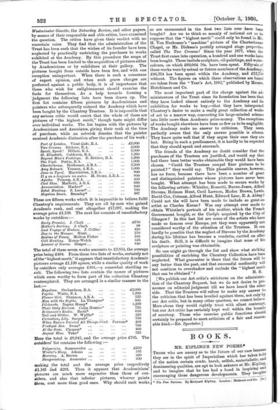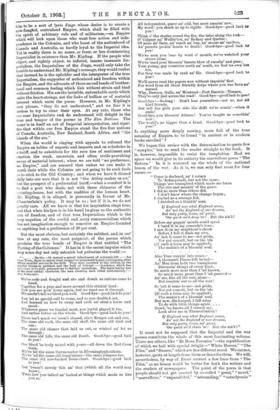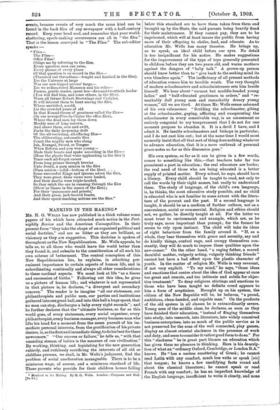BOOKS.
MR. KIPLING'S NEW POEMS
THOSE who are uneasy as to the future of our race because they see in the spirit of Imperialism which has taken hold of the nation certain crude, harsh, selfish, materialistic, and domineering qualities, are apt to look askance at Mr. Kipling, and to imagine that he has had a hand in inspiring and encouraging these dangerous developments. They imagine • Tits .Five Haim. By Budyard Kipling. London : Methuen and Co. P5.1 him to be a sort of lyric Jingo whose desire is to create a new-fangled, centralised Empire, which shall be filled with the spirit of arbitrary rule and of militarism,—an Empire which will look upon those who want free action and inde- pendence in the Colonies, and who boast of the nationhood of Canada and Australia, as hardly loyal., to the Imperial idea. Yet in reality there is no saner, or freer, or less domineering Imperialist in existence than Mr. Kipling. If the people who object, and rightly object, to inflated, insane, insensate Im- perialism, the Imperialism of the Jingo, would only take the trouble to understand Mr. Kipling's message, they would realise that instead he is the upholder and the interpreter of the true Imperialism, the supporter of nationhood and freedom within the Empire, and the advocate of those sacred bonds of brother- hood and common feeling which link without strain and bind without friction. His are the invisible, unbreakable cords which unite the heart-strings, not the links of bullion or of material interest which unite the purse. However, in Mr. Kipling's own phrase, "they do not understand," and we fear it is useless to try to clear their eyes. At any rate, those who are sane Imperialists and do understand will delight in the tone and temper of the poems in The :Five Nations. The name is in itself an act of Imperial interpretation, and signi- fies that within our free Empire stand the five free nations of Canada, Australia, New Zealand, South Africa, and "the islands of the sea."
When the world is ringing with appeals to refound the Empire on tables of exports and imports and on schedules in a tariff, and to substitute for the sure ties of sentiment and emotion the weak, uncertain, and often strife-provoking nexus of material interest ; when we are told "no preference, no Empire," and are assured that unless we can make it worth their while the Colonies aie not going to be such fools as to stick to the Old Country; and when we have it dinned daily into our ears that it is not "the Abbey makes us we," but the prospect of a preferential tariff,—what a comfort it is to find a poet who deals, not with these chimeras of the counting-house, but with the realities of the human heart. Mr. Kipling, it is alleged, is personally in favour of Mr. Chamberlain's policy. It may be so ; but if it is, we do not greatly care. All we know is that his inspiration rings true, and that when his lyre is in his hand he giyes us the authentic airs of freedom, and of that true, Imperialism which is the very negation of the sordid and ,sorry e.ernmercialism which has not imagination enough to conceive an Empire founded on anything but a preference of 20 per cent.
Not the most obvious, but certainly the subtlest, and, in our view at any rate, the most poignant, of the poems which proclaim the true bonds of Empire is that entitled "The Parting of the Columns." It has in it the secret impulse which may some day not only astonish but pulverise the world :— On the —th instant a mired detachment of colonials left — for
.1.1t
Cape Town, there to rejoin their respective homeward-bound contingents, after fifteen months' service in the field. They were escorted to the station by the regular troops in garrison and the bulk of Colonel —'s column, which has just come in to refit, preparatory to further-operations. The leave-taking was of the most cordial character, the men cheering each other continuously.'— Any Newspaper.
We've rode and fought and ate and drunk as rations come to hand, Together for a year and more around this stinkin' land : Now you are goin' home again, but we must see it through.
We needn't tell we liked you well. Good-Wye—good-luck to you!
You 'ad no special call to come, and so you doubled out,
And learned us how to camp and cook an' steal a horse and Scout: Whatever game we fancied most, you joyful played it too, And rather better on the whole. Good-bye--good luck to you!
'there isn't much we 'aven't shared, since Kruger cut and run, The same old work, the same old skoff, the same old dust and sun ; The same old chance that laid us out, or winked an' let us through. The same old Life, the same old Death. Good-bye—good luck to you!
Our blood 'as truly mixed with yours—all down the Red Cross train,
We've bit the same thermometer in Bloemingtyp. hoidtein. "We've 'ad the same old temp'rature—the same relapses too, The same old saw-backed fever-chart. Good-bye—good luck to-you! - But lwasn't inerely this an' that (which all the world may know), 'Twas how you Calked an' looked at things which made us like you 80.
All independent, queer an' odd, but most amazin' new,
My word ! you shook us up to rights. Good-bye--good luck to you!
Think o' the stories round the fire, the tales along the trek- 0' Calgary an' Wellin'ton, an' Sydney and Quebec ; Of mine an' farm, an' ranch an' run, an' moose an' cariboo, An' parrots peclrin' lambs to death ! Good-bye—good luck to you!
We've seen you 'erne by word o' mouth, we've watched your rivers shine, We've 'eard your bloomin' forests blow of eucalip' and pine; Your young, gay countries north an' south, we feel we own 'em too, For they was made by rank an' file. Good-bye—good luck to you!
We'll never read the papers now without inquirin' first
For word from all those friendly dorps where you was born an' nursed.
Why, Dawson, Galls, an' Montreal—Port Darwin—Timaru, They're only just across the road! Good-bye—good luck to you!
Good-bye !—So-long ! Don't lose yourselves—nor us, nor all kind friends, But tell the girls your side the drift we're comin'—when it ends !
Good-bye, you bloomin' Atlases ! You've taught us somethin' new: The world's no bigger than a kraal. Good-bye—good luck to you!"
Is anything more deeply moving, more full of the true meaning of Empire, to be found "in ancient or in modern
books enrolled " ?
We began this review with the 'determination to quote few "samples," but to send the reader straight to the book. It is, however, impossible to resist the temptation. Had we space we would give in its entirety the marvellous poem "The Return." In it is summed up the whole of the national lesson of the war. As it is, we con only find room for four verses :— " Peace is declared, an' I return To 'Ackneystadt, but not the same; Things 'ave transpired which made me learn The size and meanin' of the game.
I did no more than others did, I don't know where the change began ; I started as a average kid, I finished as a thinkin' man.
If England was what England seems,
An' not the England of our dreams, But only putty, brass, an' paint, 'Ow quick we'd drop 'er! But she ain't!
Before my gappin' mouth could speak I 'eard it in my comrade's tone ; I saw it on my neighbour's cheek Before I felt it flush my own. An' last it come to me—not pride, Nor yet conceit, but on the 'ole (If such a term may be applied), The makin's of a bloomin' soul. • .
Also Time runnin' into years—
A thousand Places left be'ind- An' Men from both two 'emispheres Discussin' things of every kind ; So much more near than I 'ad known,
So much more great than I 'ad guessed— An' me, like all the rest, alone—
But reachin' out to all the rest !
So 'ath it come to m—not pride, Nor yet conceit, but on the 'ole (If such a term may be applied), The makin'a of a bloomin' soul. But now, discharged, I fall away To do with little things again. . Gawd, 'oo knows all I cannot say, Look after me in Thamesfontein !
If England was what England seems, An' not the England of our dreams, But only putty, brass, an' paint,
'Ow quick we'd chuck 'er ! But she ain't !"
It must not be supposed that the Imperial and the war poems constitute the whole of this most fascinating volume. There are others, like "Et Dona Ferentes "—the republication of which we hail with special delight—" White Horses," "The Files," and "Sussex," which are in a different mood. We cannot, however, quote at length from them or describe them. We will, nevertheless, by way of Envoi extract a few lines from "The Files," as no lesson could be better for both the writers and the readers of newspapers. The point of the poem is that people should not get excited by so-called "great," "novel," "marvellous," "unparalleled," "astounding," " cataclysmic " events, because events of very much the same kind can be found in the back files of any newspaper with a half-century record. Keep your head cool, and remember that your world- shattering, epoch-making occurrences are all in "the files." That is the lesson conveyed in "The Files." The sub-editor speaks:— "Files— The Files—
Office Files!
Oblige me by referring to the files.
Every question man can raise, Every phrase of every phase
Of that question is on record in the files—
(Threshed out threadbare—fought and finished in the files).
Ere the Universe at large
Was our new-tipped arrows' tarp—
Ere we rediscovered Mammon and his wiles- Faenza, gentle reader, spent her—five-and-twentieth leader (You will find him, and some others, in the files).
Warn all future Robert Brownings and Carlyles, It will interest them to hunt among the files,
Where unvisited, a-cold,
Lie the crowded years of old
In that Kensal-Green of greatness called the files—
(In our newspaPere-la-Chaise the office files), Where the dead men lay them down Meekly sure of long renown, And above them, sere and swift, Packs the daily deepening drift
Of the all-recording, all-effacing files—
The obliterating, automatic files.
Count the mighty men who slung Ink, Evangel, Sword, or Tongue
When Reform and you were young— Made their boasts and spake according in the files—
(Hear the ghosts that wake applauding in the files !) Trace each all-forgot career From long primer through brevier
Unto Death, a par minion in the files
(Para minion—solid—bottom of the files). . . .
Some successful Kings and Queens adorn the files, They were great, their views were leaded, And their deaths were triple-headed, So they catch the eye in running through the files (Show as blazes in the mazes of the files); For their paramours and priests,' And their gross, jack-booted feasts, And their epoch-marking actions see the files."




























































 Previous page
Previous page